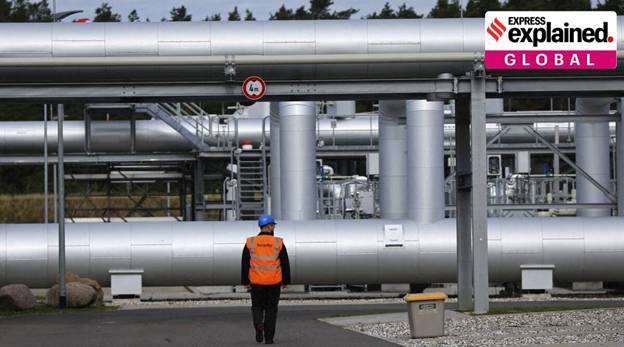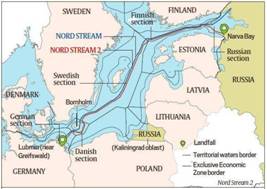NORD STREAM PIPELINE LEAKAGES

Copyright infringement not intended
Context:
- Sweden’s coast guard said that it discovered the fourth leak in the two damaged offshore pipelines that comprise the crucial Nord Stream pipelines (Nord Stream 1 and Nord Stream 2), designed to carry gas from Russia to Europe via the Baltic sea.
- The presently unexplained leak is the second of its kind to be discovered in Swedish waters, while two other leaks were found near Denmark earlier this week, Reuters reported.

Details:
- Nord Stream 1 is a 1,224 km underwater gas pipeline running from Vyborg in northwest Russia to Lubmin in northeastern Germany via the Baltic Sea.
- The majority owned by the Russian energy giant Gazprom, it is the primary network through which gas reaches Germany.
- Most of the gas goes directly to Germany, while the rest travels west and southwards through onshore links to other countries and into storage caverns, according to Reuters.
- Gazprom and five other European firms decided to build Nord Stream 2 in 2015, valued at around $11 billion.
- The 1,200-km pipeline was to run from Ust-Luga in Russia to Greifswald in Germany through the Baltic Sea and carry 55 billion cubic metres of gas per year. It was meant to run along with the Nord Stream 1 system.
- Germany is Russia’s biggest European gas consumer, and most of it comes through the Nord Stream.
- The pipelines have been at the centre of tensions lately. Russia has been accused of leveraging Europe’s dependency on its energy, as retaliation against the Western sanctions imposed on it since the Ukrainewar began.
- The leaks occurred a day before the ceremonial launch of the Baltic Pipe, which carries gas from Norway to Poland, a project that is part of Poland’s attempt to reduce its dependence on Russian energy, according to Reuters.
- While investigations have not yet revealed the cause behind the leaks, leaders from Europe and the United States suspect foul play. They alleged that it was an act of sabotage with three separate leaks and explosions occurring on the very same day.
- While the EU and the United States have stopped short of explicitly blaming Russia so far, Ukraine and Poland have not been so cautious.
- Moscow has, however, called the allegations against it “predictably stupid and absurd”, blaming the US and its collaborators for the attacks – a charge Washington has denied.
Who gains from it?
- The EU seems to be an unlikely source, as they would not seek to willingly lose out on their energy source.
- For the West, Russia would be the likely suspect. Russia has previously reduced its energy exports to Europe in retaliation since the invasion of Ukraine led to sanctions on it.
- Russia is also under the scanner because the leaks occurred a day before the launch of the Baltic Pipe, which would lessen Poland’s dependence on Russian energy.
- However, as the Nord Stream pipelines are majority controlled by Russia’s Gazprom, it is unclear why Moscow would damage the infrastructure it has a majority stake in and spent billions constructing.
- Europe continues to be heavily dependent on Russian energy and any damage to the pipelines would mean Russia losing its bargaining chip.
- European nations, who want to wean themselves off Russian energy, have increasingly turned towards the US, from whom they purchase liquified natural gas (LNG) that comes via ships.
- Russia alleges that the US has much to gain from the stoppage of the pipelines, as it can become a larger exporter of energy. However, such an attempt by the United States would carry immense risk and sever the close ties it shares with European countries, especially its own NATO allies.




1.png)
